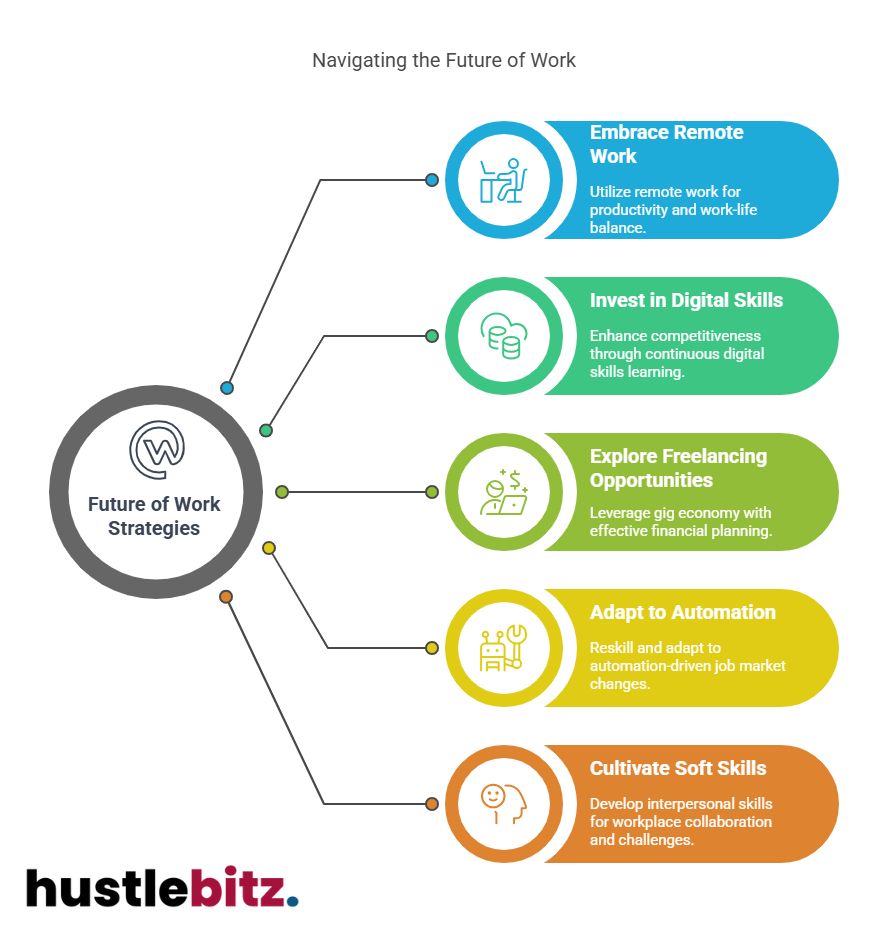Career growth in the digital age hinges on several key trends. The rise of remote work offers flexibility and access to a global talent pool. Digital skills are essential, with a focus on continuous learning to stay competitive. The gig economy is expanding, allowing professionals to choose varied projects while necessitating sound financial planning. Automation and AI demand reskilling and heightened digital literacy. Strong soft skills like emotional intelligence remain crucial for collaboration. Understanding industry-specific trends fosters adaptability. By exploring these dynamics, you can gain insights that will further enhance your career trajectory.
Key Takeaways
- Embrace Remote Work: Leverage the flexibility of remote work to enhance productivity and achieve a better work-life balance.
- Invest in Digital Skills: Continuous learning and digital literacy are essential for staying competitive in an evolving job market.
- Explore Freelancing Opportunities: The gig economy offers diverse projects and flexible work arrangements, but requires effective financial planning.
- Adapt to Automation: Reskilling and adaptability are crucial as automation reshapes job roles and industry demands.
- Cultivate Soft Skills: Strong interpersonal and emotional intelligence skills are vital for collaboration and navigating complex workplace challenges.

Rise of Remote Work
How has the rise of remote work transformed the landscape of career opportunities in the digital age? The shift to remote work has fundamentally altered how organizations operate and how professionals engage with their careers.
One of the primary remote work benefits is the flexibility it offers, allowing individuals to tailor their work environments to suit personal preferences and enhance productivity. This flexibility often leads to improved work-life balance, as employees can more easily juggle personal and professional responsibilities.
Moreover, remote work has facilitated enhanced team collaboration through the use of advanced productivity tools. These tools enable seamless communication and project management, allowing teams to function effectively despite physical distances. As a result, organizations can tap into a global talent pool, significantly broadening career opportunities for individuals regardless of geographical constraints.
Virtual networking has also emerged as a crucial element of modern career development. Professionals can now connect with peers, mentors, and industry leaders across the globe, fostering relationships that were previously limited by location. This expanded networking capability not only enhances career prospects but also encourages the sharing of diverse perspectives and knowledge.
Importance of Digital Skills

In today’s rapidly evolving job market, possessing strong digital skills has become essential for professionals seeking to remain competitive and advance their careers. Digital literacy is no longer a luxury but a necessity, as employers increasingly prioritize candidates who can navigate the complexities of technology. This shift underscores the importance of ongoing skill assessment, allowing individuals to identify gaps in their expertise and take corrective action.
Online courses have emerged as valuable resources for professionals aiming to enhance their digital skill set. These platforms offer flexible learning opportunities that cater to various schedules and learning paces, enabling individuals to acquire knowledge in areas such as data analysis, digital marketing, and software development. This accessibility fosters a culture of continuous learning, vital for those looking to keep pace with industry advancements.
Moreover, tech adaptability has become a critical competency. As digital tools and platforms evolve rapidly, professionals must be willing to embrace change and learn new technologies. This adaptability not only enhances individual performance but also contributes to overall organizational agility.
The Gig Economy Expansion

Rising alongside advancements in technology, the gig economy has transformed traditional employment paradigms, offering professionals greater flexibility and diverse opportunities to monetize their skills. This shift has led to an increase in freelance opportunities across various sectors, where individuals can choose projects that align with their interests and expertise.
However, as gig work expands, professionals must navigate challenges such as income variability and job security.
Key factors influencing the gig economy include:
- Increased freelance opportunities: Workers can leverage skills in various domains, from graphic design to software development.
- Platform competition: Numerous gig platforms are emerging, providing a wider range of choices for both freelancers and clients.
- Work-life balance: The flexibility of choosing when and where to work allows individuals to better manage their personal and professional lives.
- Income variability: Freelancers face fluctuating incomes, which necessitates effective financial planning and adaptability.
- Job security concerns: Unlike traditional employment, gig work often lacks stable benefits, prompting professionals to consider alternative forms of insurance and retirement planning.
Despite these challenges, the gig economy presents a compelling landscape for career growth. Professionals can cultivate diverse skill sets and engage in meaningful projects that enhance their portfolios.
As the demand for flexible work arrangements continues to rise, individuals who are adaptable and proactive in navigating the gig economy will likely find sustainable paths to success in the digital age.
Automation and AI Impact

The rapid integration of automation and artificial intelligence (AI) into the workplace is fundamentally reshaping career trajectories, demanding that professionals adapt to new technologies and evolving skill requirements.
As organizations increasingly deploy AI-driven solutions, concerns about job displacement and automation anxiety have emerged. Many workers fear that their roles may become obsolete, leading to heightened stress and uncertainty about the future workforce landscape.
However, this technological revolution also presents opportunities for growth and development. Reskilling initiatives are becoming essential for both employees and employers, ensuring that the workforce remains competitive in a rapidly changing environment. By investing in training programs that emphasize digital literacy, critical thinking, and emotional intelligence, companies can equip their teams to thrive alongside automation technologies.
Moreover, the discourse surrounding AI ethics is gaining traction, emphasizing the importance of responsible AI implementation. As organizations navigate the deployment of AI, they must prioritize ethical considerations to mitigate potential biases and ensure equitable access to opportunities within the evolving job market.
Ultimately, the impact of automation and AI is multifaceted, encompassing both challenges and opportunities. Professionals must embrace lifelong learning and adaptability to harness the benefits of these technologies while addressing the associated fears of job displacement.
Data-Driven Decision Making

Leveraging data-driven decision making has become essential for organizations seeking to enhance efficiency and competitiveness in the digital age. This approach relies on the systematic collection, analysis, and interpretation of data to inform strategic decisions. By utilizing data analytics, businesses can gain valuable insights that guide their operations and strategies.
Key components of data-driven decision making include:
- Data Analytics: The process of examining raw data to uncover patterns and trends.
- Predictive Modeling: Utilizing statistical techniques to predict future outcomes based on historical data.
- Business Intelligence: Tools and systems that analyze business data to support better decision-making.
- Data Visualization: The graphical representation of data, allowing stakeholders to grasp complex information quickly.
- Performance Metrics: Quantifiable measures used to assess the effectiveness of actions taken within an organization.
Incorporating these elements enables organizations to make informed decisions that are both timely and relevant. For instance, data analytics can reveal customer behavior trends, while predictive modeling can forecast sales and market demand.
Business intelligence tools help in aggregating and analyzing data from various sources, facilitating a comprehensive view of operations. Data visualization transforms complex datasets into accessible formats, enabling stakeholders to make quick, informed decisions.
Soft Skills Demand
As organizations increasingly rely on data-driven decision making, the demand for soft skills has emerged as a vital complement to technical expertise in the digital landscape. The ability to effectively navigate interpersonal relationships and collaborate within diverse teams is becoming essential for professionals at all levels. Emotional intelligence, in particular, plays a crucial role in fostering a positive work environment, enhancing communication strategies, and improving overall productivity.
Adaptability training has become a key focus within organizations, as the rapid pace of change in the digital age requires employees to adjust quickly and efficiently. Those who can demonstrate flexibility in the face of uncertainty are highly valued, as they contribute to more resilient teams and organizations. Furthermore, understanding teamwork dynamics helps individuals to operate cohesively with their colleagues, ultimately driving project success and innovation.
Conflict resolution skills are equally important in this context. The ability to address and mediate disagreements constructively ensures that teams remain focused on their goals and maintain a harmonious working environment. As companies prioritize cultivating a culture that values collaboration and open communication, professionals who possess strong soft skills will be better positioned for career growth.
Industry-Specific Trends

Emerging technologies are reshaping industry-specific trends, driving demand for specialized skills that align with the unique needs of various sectors. As we navigate through this era of rapid industry evolution, professionals must stay informed about the shifts occurring within their fields. These changes not only create opportunities but also necessitate an understanding of how to adapt to the new landscape.
Key trends impacting various industries include:
- Niche Markets: The rise of targeted products and services tailored to specific consumer needs is becoming increasingly prevalent.
- Sustainable Practices: As businesses face pressure to adopt eco-friendly measures, skills related to sustainability are becoming essential.
- Regulatory Changes: Professionals must remain agile in understanding and complying with new regulations that can affect their operations and strategic direction.
- Diversity Initiatives: The emphasis on creating diverse and inclusive workplaces is prompting organizations to seek talent that can foster these values.
- Technological Integration: Proficiency in digital tools and platforms is critical as industries leverage technology to enhance efficiency and innovation.
In this evolving landscape, those who embrace continuous learning and skill development will position themselves favorably. Adapting to these industry-specific trends not only contributes to personal career growth but also ensures that organizations remain competitive in a rapidly changing market. Understanding these dynamics will be crucial for anyone looking to thrive in their respective fields.
Final Thoughts
In the digital age, career growth is closely tied to understanding and adapting to emerging trends. The rise of remote work, the demand for digital skills, and the expansion of the gig economy emphasize the need for flexibility and continuous learning. As automation and AI reshape job roles, professionals must prioritize reskilling while cultivating essential soft skills like emotional intelligence and adaptability. By embracing data-driven decision-making and staying attuned to industry-specific trends, individuals can enhance their career trajectories and contribute to thriving organizational cultures. Ultimately, the ability to adapt, learn, and connect with others will be crucial for unlocking future opportunities and achieving long-term career fulfillment.




